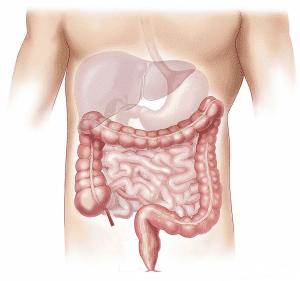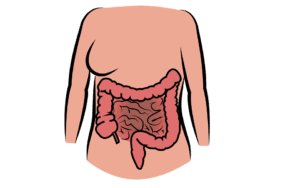Short Bowel Syndrome (SBS)
What is short bowel syndrome (SBS)?
Short bowel syndrome (SBS) is a disorder where an individual cannot get enough nutrients and water from the food they eat due to poor function of the small intestine.
What are the symptoms of SBS?
The symptoms of SBS vary in severity. The main symptom is persistent diarrhea. Other symptoms include:
- Cramping
- Bloating
- Fatigue
- Heartburn
- Excessive gas
- Vomiting
- Foul smelling stool
- Weight loss
- Dehydration
Additional symptoms due to the lack of the small intestine’s ability to absorb nutrients and vitamins include:
- Anemia
- Fatty liver
- Gallstones
- Kidney stones
- Easy bruising
- Bone pain
- Muscle cramping and spasms
- Intolerance to certain foods (such as lactose intolerance)
What causes SBS?
The main cause of SBS is removal of part or all of the small intestine due to disease, injury, or birth defect through surgery. Diseases that require surgery include cancer, Crohn’s disease, and treatment of damage caused by chemotherapy or radiation. Removal could also be caused by a birth defect in which a child is born with a short small intestine or part of it missing.
What treatment options are available for SBS?
Treatment of SBS is directed at symptom management and nutritional support to provide necessary vitamins and minerals. Treatment options include:
- Medications to control diarrhea
- Vitamin and mineral supplements
- Medications to reduce stomach acid and/or intestinal bacteria
- Medication to improve lactose intolerance
- Intravenous fluid for dehydration
- Feeding tube insertion
- Special diets, such as small frequent meals and avoidance of high sugar, fiber, and fat foods
- Administration of growth hormones to improve intestinal absorption
- Intestinal transplant in rare cases
Where can I find more information on short bowel syndrome (SBS)?
Short Bowel Syndrome (SBS) Articles

Familial Adenomatous Polyposis: Jenny’s Rare Patient Story

A Phase 3 Study is Being Designed to Evaluate Vurolenatide for Short Bowel Syndrome

Preliminary Data Available on Vurolenatide for Short Bowel Syndrome


EMA Grants Orphan Drug Designation to Therapy for Short Bowel Syndrome

Researcher Earns $1.9M Grant to Study Short Bowel Syndrome

Ally’s Story: Crocheting to Raise Awareness for Short Bowel Syndrome




